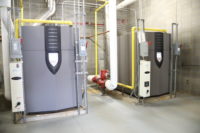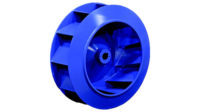Technology and innovation continue to drive significant improvements in the energy efficiency of hydronic condensing boilers. Additionally, minimum efficiencies are continuing to be pushed upward by regulation. These factors are all inspiring increased consumer demand that manufacturers, distributors, and service business owners must be prepared for to succeed in today’s competitive market.
Advantages of High-Efficiency Natural Gas Hydronic Condensing Boilers
High-efficiency natural gas condensing boilers offer a wide range of benefits that make them suitable for many applications in a variety of industries, including education, health care, hospitality, commercial real estate, and institutional facilities.
When heating a large space or operating in consistently cold conditions, the financial return of hydronic boilers is compelling. High-efficiency performance in medium or large commercial and industrial settings offers meaningful savings that add up quickly and scale, allowing owners to see a tangible return on their investments.
Hydronic condensing boilers powered by natural gas, a cleaner-burning fuel in abundant supply, help users reduce their carbon footprint relative to noncondensing boilers. Replacing aging equipment with modern, high-efficiency units can result in an immediate reduction in energy costs. In addition, condensing boilers provide the same heating output as electric-powered equipment, often at a lower operational cost based on utility rates.
The efficient performance of condensing boilers has the added benefit of reducing the daily wear and tear of operation. If properly installed and applied, hydronic condensing boilers generally require very little specialized training, and the use of stainless steel heat exchangers provides a more robust, long-lasting material. Following recommended service guidelines should extend the life of the equipment, amplifying the value of the high-efficiency operation.

An uncertain economic outlook and the continuing disruption of global fuel supplies could help make high-efficiency hydronic condensing boilers an even more attractive option this year and beyond. With heating costs across the U.S. expected to be higher than average this year, natural gas-powered condensing boilers can offer owners substantial savings through high-efficiency operation coupled with the lower relative costs of natural gas.
Factors in the Efficiency of Natural Gas Hydronic Condensing Boilers
A number of innovations have allowed condensing boilers to achieve a high level of energy efficiency. Technological features, design innovations, and advances in materials have given designers and manufacturers important new opportunities to offer optimized performance.
The stainless steel construction of hydronic condensing boilers has been a key element of the increased efficiency that modern condensing boilers offer. In addition to their light weight, stainless steel boilers have powerful resistance to corrosion. That characteristic is essential to the successful operation of condensing boilers, where high-efficiency operation results in the production of acidic moisture. Many materials would be compromised by exposure to the corrosive quality of the condensate but stainless steel is not.
Different heat exchanger designs allow for application flexibility. They can be configured in a variety of ways to fit many spaces, whether new installation or replacement applications.
Flexibility in output is equally critical to high-efficiency boiler performance. Modern hydronic condensing boilers that deliver a turndown ratio of 20:1 or greater allow users to fine-tune the operation of their equipment. Longer, consistent heating run times at optimized temperatures reduce short firing cycles that use excessive energy and produce wear on boiler components.
Low return water supply temperatures must also be achieved to realize maximum efficiency. The optimal return water supply temperature for any hydronic condensing boiler is moderate, between 80°-120°F, but ultimately depends on the particular equipment, its application, elevation, climate, and other conditions. Modern, high-efficiency, condensing boilers offer precise modulating return water temperatures, ensuring heat output is produced using the least possible amount of fuel.
The next frontier of energy efficiency features for hydronic condensing boilers is intelligent, optimized combustion, which is already being deployed by some manufacturers. With real-time, electric, fuel-to-air ratio control, the most advanced available condensing boilers are capable of delivering optimized efficiency through the entire turndown range. Powerful algorithms provide smart, automated management of combustion, so users no longer have to choose between turndown, efficiency, and clean emission levels. When such detailed control is available in a boiler with an exceptional turndown ratio, there is unrivaled capacity for energy efficiency and reliability.




